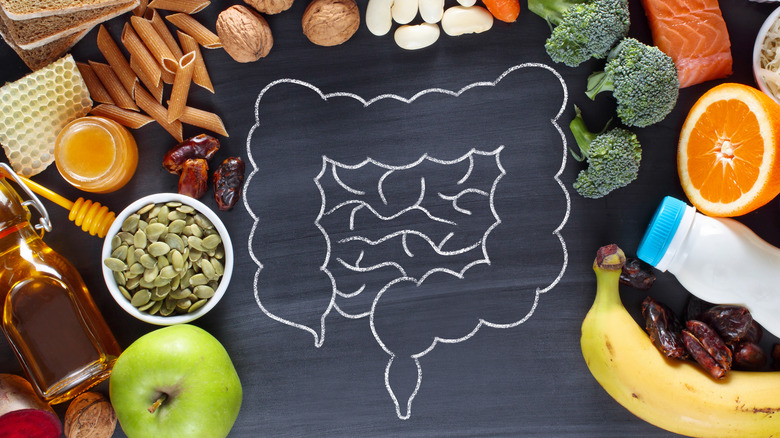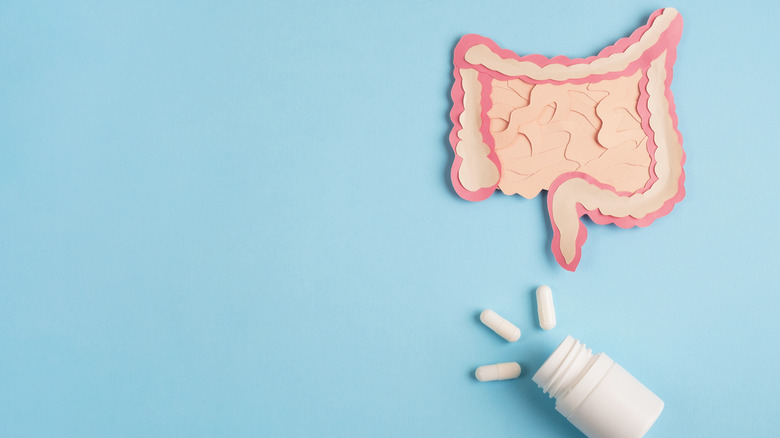Co-Founder Of Seed Health, Raja Dhir, Talks About The Gut-Brain Connection - Exclusive Interview
Have you ever felt "butterflies" in your stomach when you were anxious? This is a classic example of the gut-brain connection, a complex network of biological pathways that link our gut to our brain. For many years, researchers and doctors have believed that anxiety and depression contributed to problems like irritable bowel syndrome (IBS), constipation, diarrhea, bloating, pain, and stomach upset. This is true — but now, research is showing that it may also be the other way around (via John Hopkins Medicine). "The gut-brain axis is a bidirectional line of communication, meaning that gut health impacts brain health, and vice versa," said Raja Dhir, co-founder and co-CEO of Seed Health, a microbiome science company.
Dhir has a background in life sciences and experience translating scientific research in the microbiome field. He has designed several clinical trials with notable academic institutions, including Harvard Medical School. Seed Health is working to develop next-generation probiotics targeting mental well-being and issues like anxiety, depression, and stress. In this exclusive interview with Health Digest, Dhir shared with us the complexities of the gut-brain connection, how it affects mental and emotional health, and the latest scientific discoveries in the field. He also talked about ways you can improve your gut and mental health, including probiotic benefits and foods you can eat.
The gut-brain connection explained
Can you tell us a bit about your background and about your company, Seed Health?
As co-founder and co-CEO of Seed Health, a microbiome science company, I guide the development of our decentralized platform to enable rapid, efficient advancement of microbial research from discovery to market. I am also co-founder of our environmental research division SeedLabs, as well as LUCA Biologics, our women's health venture in partnership with Dr. Jacques Ravel. I lead our academic collaborations, working with institutions like MIT, Harvard University, Stanford University, California Institute of Technology (Caltech), and the National Institute of Health (NIH) to drive innovation across the fields of microbiology, genetics, immunology, and ecology. Along with Dr. Ravel, I also co-chair our Scientific Board, an interdisciplinary group of scientists and doctors who lead research teams and teach at institutions including the teaching hospital of Harvard Medical School and the Trial Innovation Unit of Massachusetts General Hospital (MGH).
At Seed Health, we are pioneering applications of microbes for human and planetary health. Founded to realize the potential of microbes, our platform enables the translation of breakthrough science across a portfolio encompassing both indication-specific and preventive applications for gastrointestinal and digestive health, women's health, skin and oral care, pediatrics, mental health, metabolic function, and nutrition. Our consumer innovations are commercialized under Seed with a mission to bring much-needed precision, efficacy, education, and perspective-shifting science communication to the global category of probiotics.
Our latest venture is a partnership with Axial Therapeutics, a clinical-stage biopharmaceutical company, to develop a program targeting the microbiome gut-brain axis for mental health, with the potential to impact well-being in areas like anxiety, depression, and stress response. The program builds on over a decade of discoveries from the Caltech lab of gut-brain pioneer (and Seed Health Scientific Board and Board of Directors member) Dr. Sarkis Mazmanian, whose lab at Caltech first discovered the critical contributions of intestinal microbes and microbial metabolites in neuropsychiatric conditions.
What is the gut-brain connection, exactly?
The gut-brain connection — or, more specifically, the microbiome gut-brain axis — is the rich and complex network of physiological pathways that link our gut to our brain. The gut and brain use various forms of communication to converse, the most prominent physical connection and pathway being via the vagus nerve, one of the longest nerves in the human body. Other messages are sent in the form of microbial metabolites such as organic acids (like short-chain fatty acids), proteins, fats, and neurotransmitters, which reach the brain by hitching a ride through blood vessels or stimulating the vagus nerve.
Insights into this gut-brain crosstalk have revealed a dynamic communication system that not only influences intestinal activities like digestion and motility, but also regulates immune and pain response, metabolism, mood, social behavior, and cognition.
More recent research has focused on elucidating the role of the gut-brain axis in human health and disease, such as a growing number of psychological and neurological diseases, including Autism Spectrum Disorder, depression and anxiety, Parkinson's, Alzheimer's disease, and Irritable Bowel Syndrome (IBS).
The link between your gut and mental health
How is gut health linked to mental and emotional struggles like stress, anxiety, and depression?
Over the past few decades, research has illuminated and defined connections between the gut microbiome and the development of various mood and neuropsychiatric disorders. For example, we know that there is disparity between the composition and diversity of bacteria between healthy individuals and depressed patients and that gut microbiome diversity shares an inverse relationship with the development of Major Depressive Disorder (MDD). Through animal research, we also know that changes in the gut microbiome can predispose changes in mood and behavior.
This fundamental research allows us to use the gut microbiome and gut microbes as unique disease "biomarkers" that drive future research directions in the management of mood disorders, and may be key to detecting and understanding the physiological processes that lead to brain disorders.
We are still far from understanding it all, but the gut-brain axis presents itself as a conduit to rethink the way we approach the standards of treatment for psychiatric and gastrointestinal disorders alike, transforming the way we think through management of psychiatric disorders.
Is the gut-brain connection a two-way street — that is, can poor gut health cause mental health issues, and can mental struggles also cause gut problems?
The gut-brain axis is a bidirectional line of communication, meaning that gut health impacts brain health, and vice versa. This network includes the central nervous system (CNS), both brain and spinal cord, the autonomic nervous system (ANS), the enteric nervous system (ENS), and the hypothalamic pituitary adrenal (HPA) axis. The HPA axis is considered the core stress axis that coordinates the adaptive responses of an organism to stressors of any kind. Environmental or emotional stress, as well as elevated systemic pro-inflammatory cytokines, activates this system and leads to the secretion of cortisol, the major stress hormone.
Both chronic and acute stressors can shift the composition gut microbiome and contribute to intestinal hyper-permeability. In vitro data shows that catecholamines (a stress hormone) can elevate certain pathogenic bacteria which may crowd out beneficial species. The heightened inflammation that frequently accompanies stress and depression triggers blooms of pathogenic bacteria that encourage dysbiosis and a leaky gut. This can work in the opposite direction too — hence the "axis." Studies have demonstrated that microbiota can influence stress response and anxiety-like behavior. In fact, a recent publication by Dr. Mazmanian demonstrates that certain gut microbes can impact social interactions via unique neuronal pathways in mice.
How to support the gut microbiome
Can you tell us about some of the latest research on the gut-brain connection and how Seed Health will be putting these findings to practical use?
One particularly compelling area of gut-brain research explores how specific microbial metabolites influence neuropsychiatric health, and how probiotic treatments may be used to control these metabolites for mental health outcomes. Dr. Mazmanian's Caltech lab was the first to discover the critical contributions of intestinal microbes and microbial metabolites in neuropsychiatric conditions, as well as the molecular signals from gut bacteria that can influence anxiety behavior.
More recently, his lab published a study in Nature, which demonstrated that specific microbes alone could activate neuronal activity in the hypothalamus to reduce levels of corticosterone, a stress hormone in mice (known in humans as cortisol). After first confirming the link between increased levels of corticosterone and reduced microbiome diversity in mice, his team identified a bacterial species (Enterococcus faecalis) which promotes social activity and reduces corticosterone levels following social stress.
His latest paper, published earlier this year in Nature Medicine, found that manipulating levels of a microbial metabolite in the gut, 4-ethylphenyl sulfate (4EPS), has profound effects on social behavior — first in mice, then translating to an open-label clinical study in humans. Building on a previous Nature study linking heightened levels of 4EPS with anxiety-like behaviors in mice, the results imply that modulation of the gut microbiome — through the introduction of the probiotic Bacteroides fragilis, previously shown to reduce levels of this metabolite — could reduce anxious behaviors, with implications for human anxiety or other mood conditions.
Until recently, we've lacked clarity into how the gut microbiome regulates emotions and impacts complex behaviors. Advancements in gut-brain research — and particularly these out of Dr. Mazmanian's lab — not only evolve our understanding of neurology, gastroenterology, and associated pathologies, but present an exciting opportunity to reimagine our approach to mental health. Now, our program will translate this breakthrough research for a new class of probiotics and therapeutics that could modulate the gut microbiome and target the gut-brain pathway for neuropsychiatric health.
What natural methods can people utilize to improve their gut and mental health?
Diet and nutrition are one of the foremost ways we can support the gut microbiome, and in turn, the gut-brain connection. Just as there is no one universally healthy microbiome, there is no one-size-fits-all, "perfect" diet. Generally, however, a plant-rich diet, low in sugar, preservative agents, processed foods, food additives, and saturated fats, tends to correlate with a "healthy" microbiome.
Sleep is also important for your microbiome, as microbes follow their own circadian rhythms and require rest to stay in balance. Evidence shows that sleep patterns can affect the microbiome and the gut-brain connection, so it's valuable to prioritize rest.
Additionally, regular exercise is significant for the gut-brain connection. Movement is helpful in stress management, and research has shown that moderate physical exercise positively modulates the relationship between the gut and brain.
Foods and probiotics for a healthy gut and brain
What foods are supportive of a healthy gut and brain?
Microbiome research has demonstrated some clear and actionable dietary guidelines. A healthy diet to support one's microbiome contains the following:
- Abundance of diverse (emphasis on diverse) sources of plant fibers and polyphenols (like vegetables, walnuts, pomegranate, berries, and green tea)
- High in fiber and microbiota-accessible carbohydrates (like broccoli, brussels sprouts, beans, and sweet potatoes)
- High in Omega-3 and monounsaturated fat (like salmon, sardines, avocados, and olive oil)
- Low in sugar, preservative agents, processed foods, food additives
- Low in saturated fat
Can probiotics help ease symptoms associated with mood disorders? Should everyone be taking them?
While research into the gut-brain axis shows a lot of promise, it's also important to acknowledge that this is a relatively new field of study and probiotic applications for neurological and mood disorders are still being studied. Currently, there are no known probiotic innovations on the market that have been proven to directly ease symptoms of mood disorders. Additionally, traditional or existing treatment options do not consider nor target the underlying role of the gut microbiome.
The gut-brain connection and the resulting commercialization is an area where, to date, evangelism has largely outpaced the evidence. The emergence of "psychobiotics," for example, while often not evidence-based, demonstrates a growing willingness and hope for alternative treatments. At the same time, anxiety disorders impact over 40 million adults in the United States, and rates of anxiety and depression have spiked over the course of the ongoing pandemic
That said, Dr. Mazmanian's research unlocks a novel framework to reimagine our approach to mental health. We are now at a critical inflection point in gut-brain research, which provides insights that allow movement beyond correlation to causation and provides the opportunity to develop probiotics that could maintain or improve mental well-being.
To the question of whether we should all be taking probiotics — everyone's physiology and experiences are unique, as are our particular needs. It's important to remember that probiotics are a science, and specific strains are studied for specific outcomes. Our DS-01™ Daily Synbiotic, for instance, is formulated with specific strains studied to support digestive health, cardiovascular health, dermatological health, gut immune function, gut barrier integrity, and micronutrient synthesis.
Our modern living practices and daily choices — such as more time spent indoors (and away from natural environments), poor diet, lack of fiber, antibiotic overuse, and other environmental factors — can disrupt the microbiome. For these reasons, and alongside critical levers like diet and nutrition, clinically and scientifically studied probiotics can be an impactful way to nurture and support the microbiome and systemic health beyond digestion.
Seed Health is working toward advancements in gut-brain research, which present the potential to impact well-being in areas like anxiety, depression, and stress response, reimagining ways to approach mental health.
This interview was edited for clarity.





